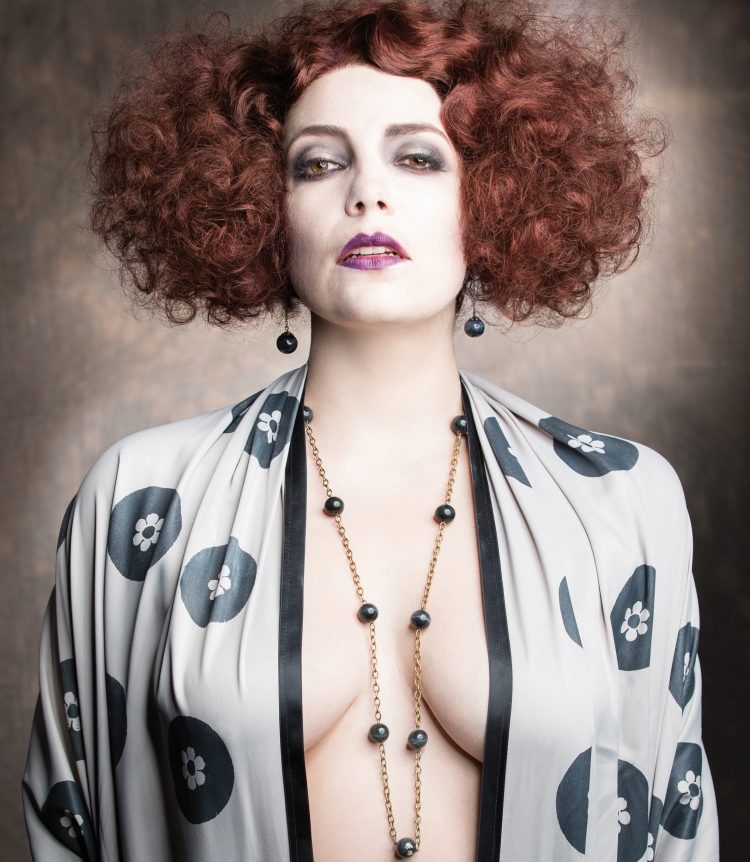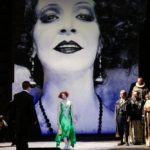 Volksoper’s new Czardas Princess, produced by Peter Lund (Axel at Heaven’s Door), promised something glamorous and exotic. Emmerich Kálmán’s Die Czárdásfürstin premiered in war-torn Vienna, was meant as escapist entertainment. And more. Lund focuses on the social context, discreetly referring to the war, rather as does Downton Abbey. And Lund’s design captures glamorous turn-of-century Vienna, the title role in a daring see-through art nouveau gown, uncannily like an iconic Klimt portrait.
Volksoper’s new Czardas Princess, produced by Peter Lund (Axel at Heaven’s Door), promised something glamorous and exotic. Emmerich Kálmán’s Die Czárdásfürstin premiered in war-torn Vienna, was meant as escapist entertainment. And more. Lund focuses on the social context, discreetly referring to the war, rather as does Downton Abbey. And Lund’s design captures glamorous turn-of-century Vienna, the title role in a daring see-through art nouveau gown, uncannily like an iconic Klimt portrait.
Newsreel footage of pre-war Vienna, with trams as well as horses: the historical context to Kálmán’s (1915) Die Czárdásfürstin . Then curtain-up on an austere library in what looks like a (Downton) country house. Countess Stasi (Johanna Arrouas) is playing the organ, wearily: Edwin Prince Lippert (Szabolcs Brickner), bored, is reading a book. They’re wide apart, opposite ends of the stage. Edwin, do you know how much I love you: soo much. Then Edwin’s parents, Prince Leopold (Wolfgang Gratschmaier) and Anhilte his wife, redoubtable, legendary Sigrid Hauser. She loved his father that much too! God, she’s glad he’s rescued from the Sodom and Gomorrah of Budapest. Rescued? Now he can sit in that library for an eternity.
The stage set crumbles, disintegrates like a surrealist dream sequence in a Salvador Dali film. To reveal the temptress Sylva Varescu (Ursula Pfitzner). We’re in that seedy night-club in Budapest. Sylva, on the raised stage, she the centre of a pyramid of marionettes. It’s all in black, white, and silver: an early silent film, or dream sequence.

She, Pfitzner, pulls a man from one of the side tables, who crawls to her on his knees. The dancing girls cavort like harlequins, in white tights, silver-spangled black tops, with huge white nipples, and wearing peaked hats. Three of them are swinging on the huge letters spelling ORPHEUM.
The men, Sylva’s admirers, include Count Boni (Michael Havlicek), Edwin’s friend- a hit in duets with Joanna Arrouas- and the older Feri, who’s forever reminiscing of his own Czarda’s princess…
And she’s leaving for New York. Poor Sylva all alone in America! The girl dance troupe projected in a film come alive. There’s a room of dressing tables, used as props for erotic acrobatics; then a line-up front of stage in a can-can routine. Fabulous choreography. (Hang on, isn’t the one in the middle, with suspenders, in drag?)
In the next fast-moving scenes, Sylva and Edwin are in bed, and appearing to have very passionate sex. He’s been away for two months. Sylva, I want only you, he sings. But why her? A cue for one of the classic numbers: Lovely girls all around, (he only has eyes for one). Now he’s on his knees pleading in his shirt and not-so-long johns: definitely not in his trousers. There’s no doubt about the nature of their relationship, they’re back in bed.
Boni and his uncle Feri, a little jealous, creep in on the lovers. Then a telegram; demanding Edwin’s return. Ewin’s been called up – not even his mother could pull that trick, to stop him marrying a vaudeville girl! I love you, he pleads. Then all the better I’m leaving.
In the farewell party, their duet Love will come to you, is a highlight. Then the Hungarian gypsy spectacular: Pfitzner blasts, She’s a devil of a woman, a devil in disguise. Kálmán’s Sylva character is a feisty red-head, very much her own woman, defying convention and hypocrisy. But regarded as dangerous (sexually) and socially subversive. Pfitzner has a very pleasant soprano, and the role, lots of dialogue, demands some considerable actress. She performs well with Brickner, a solid (operatic) tenor, against her, inevitably a little colourless.
In the middle of a hot dance sequence, Edwin’s cousin Rohnsdorff (Christian Graff, the stiff-automat in uniform, with a hint of camp) presents Edwin’s call-up orders. Edwin, in the wild party atmosphere, summons a notary and promises Sylva he’ll marry her within eight weeks. No matter what fate may bring, you defy my everything, they sing.  (Edwin leaves, unaware that Edwin’s parents have officially announced his engagement to Stasi.)
(Edwin leaves, unaware that Edwin’s parents have officially announced his engagement to Stasi.)
Sylva learns straight off the press. She’d always known she didn’t fit in with his family’s class. Embittered defiant, Pfitzner reprises ‘she’s devil of a woman’, (who has you heart and soul.) A massive liner is projected backstage. She’s been tricked; she’ll go to America after all.
Act 2 opens with more newsreels, now of Sylva Varescu, who’s been making quite a name for herself on Broadway- according to the neon signs.
Meanwhile, back at the Lippert’s, Stasi is still asking Edwin, Do you still still love me . But now, don’t pretend. Es ist aus. It’s over. But only three-quarters – he’s sent her hundreds of telegrams and no reply. Shockingly- if they got married- he could get killed, or have his legs shot off. (if the latter, she’d look after him.) So ‘Let’s be like swallows and build ourselves a nest’, they duet. But Brickner’s Edwin sings aloud, he dreamed of her last night. He hardly dares reveal ‘the way I pictured you in my sleep.’ Only a dream.
The stuffy guests for the engagement ball sit lined-up like a portrait for some obscure mid-European royal family. Then the bright colours of the lively, youthful Vienna State Ballet dancers.
Sylva arrives accompanied by Boni (who agrees to be) her ‘husband’, so she can get to see Edwin. Pfitzner with that red, fuzzy hair, and in a brilliant emerald green dress. Sylva introduces Stasi, and that’s it – love at first sight- for Boni. Anhilte, Edwin’s mother, nostalgises, when love had her under it’s magic spell. In the comedy, Edwin and Sylva are back in love, and have to hide under the sofa – what a sofa! -as Boni and Stasi also get close.
Boni (Havlicek) and Arroua’s Stasi, after their romantic duet, had the audience spontaneously clapping in their dance sequence, landing in a heap on stage. Meanwhile, the hit tune, ‘Lovely girls allowed’, is reprised, as Edwin proposes all over again. As a Countess she can marry him. And if she were Sylva Varescu?
 But Sylva blows it; won’t put up with the hypocrisy, and announces – to the whole stuffy party- she’s not married to Boni, but the ‘Gypsy Princess’. And to emphasise the bombshell, a blow-up of cabaret star Sylva Varescu towers over them. Pfitzner tears up Edwin’s original marriage contract and storms out.
But Sylva blows it; won’t put up with the hypocrisy, and announces – to the whole stuffy party- she’s not married to Boni, but the ‘Gypsy Princess’. And to emphasise the bombshell, a blow-up of cabaret star Sylva Varescu towers over them. Pfitzner tears up Edwin’s original marriage contract and storms out.
More newsreel footage opening Act 3- the Sarajevo Assassination, Belgrade falls… War has broken out, Edwin sent to the front. Things get serious. But Sylva is back in the Orpheum, with Feri and Boni. Society is würscht, rubbish, Pfitzner sings, swigging a bottle of wine, take your fate in your hands, gypsy. ‘Who knows how long the world will go on turning. Tomorrow may be too late’, they sing. Terrific ensemble.
Stasi, Arrouas now in an alluring soft-pink coat, has come to fetch Edwin, who’s deserted. She’s arrived with Anhilte, Hauser fearsome, all in black, like a Lady Bracknell, she will prevail over her son: You don’t marry a man for love. She should know. The high-point is when Feri recognises Anhilte- once his great love- who deserted to marry a Count. Kupfa-Hilda, no one’s called her that for years. They dance and she wantonly casts-off layers of clothes- Hauser showing her legs- chased across the stage by Feri. Anhilte! exclaims the Prince, catching them in a passionate clinch.(It’s not what you think!) Two cabaret singers in one family; his world is falling apart. (He can’t stop Sylva’s marrying Edwin.) Liebe -das Glück wohnt überall . Love is all around in the gorgeous happy ending, the stage glowing in a pink sunset.
Volksoper, orchestra conducted by Alfred Eschwé, is world-renowned in operetta. Lund has given Czárdásfürstin the big stage treatment: using 21st century stage technology to reach new audiences. Yet it worked triumphantly, Volksoper’s audience – mainly traditional Viennese – loved it, with tumultuous applause. © PR 18.09.2018
Photos: Elissa Huber (Sylva Varescu) from the alternative cast © Johannes Ifkovits/ Volksoper Wien
Other Photos: Ursula Pfitzner (Sylva Varescu); Ursula Pfitzner, Szabolcs Brickner (Edwin), Nicolas Hagg; Ursula Pfitzner (Sylva) and Szabolcs Brickner (Edwin)
© Barbara Pállfy/ Volksoper Wien
